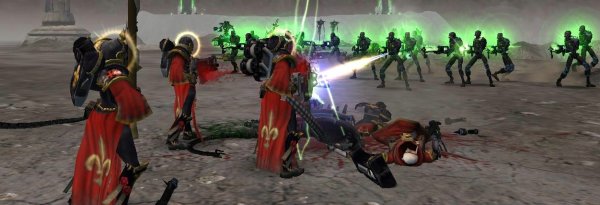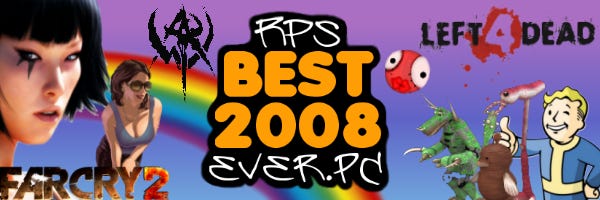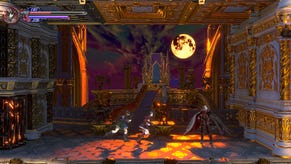Now That’s Why I Love A Best 2008 Ever! March
Christmas hurtles toward us like some sort of mad train. And before our lives come to their inevitable end as we're smooshed into the tracks, our experiences flash before our eyes. Today we're seeing March 2008.

Piracy, it seems, is not the primary issue.
John: Try telling that to our comment threads. If CliffyB's remarks in February were the trigger for a year of needlessly defending the PC as a gaming platform, then it was Stardock's report on the effects, or lack of, of piracy that kicked off That Subject. The P Word began its year-long rampage of madness, which has seen an awful lot of arguing amongst the internet, and not a single damned piece of serious research from any major publisher. Hey, who wants to discuss this for 500 comments? The tragedy of it all was the common sense pouring forth from Stardock, and their reaction to their findings, getting lost in the mire.
Kieron: That I'm still thinking about what Stardock's stance actually means for PC gaming ten months later says a lot about how fascinating Wardell's take is. Or, alternatively, how half-bright I am. While it's easy to take on face-level, as the hardest part of the anti-DRM brigade has, the specifics are what interests me. The key one is "this only works for the sort of games we make". Stardock don't make games which are pirated a lot - as in, genres and approaches to games which attract a more affluent, less likely to make the effort to pirate the thing. If you actually expand their logic, we radically change the shape of PC gaming to something that's much more like how One Life Left likes to paint it (I paraphrase: "Games about terrain"). The key line in the interview I did with Wardell described their desktop-widget-thingies (technical term) business. They regularly get people complaining about their slightly cold-edged design, expressing a preference for something a little more friendly. Wardell asks whether they changed the design, whether they'll buy them. "Well... no," is the normal answer. In practice, the people who pay for them are people who prefer the business-like edges... so that's who gets catered for. Money talks. That's probably the thing pure-pirates probably need to understand: in the capitalism's almost quasi-democratic way, they're not voting. The flip of John's argument that Piracy is irrelevant to a game's success is that the Pirates are irrelevant. The most successful games of recent times have been MMOs? Then, clearly, more MMOs will get made. It's Stardock's logic writ large. At least in the serious commercial gaming end, PC's future is that we'll get the games we pay for.
Alec: Yeah, again the thing is that Stardock are (as Wardell himself states) in a fairly unique situation, and that gives them the safety to take a stance other publishers are afraid of - whether or not that fear is justified. It's not like they're making ultra-niche titles, but they're certainly not making games that appeal to the mainstream, and as all those people leeching Call of Duty 4 and Need For Speed reveal, the mainstream is where piracy most seems to focus. Over at the Pirate Bay right now, 177 people are seeding Sins of a Solar Empire, and 965 Call of Duty 4. The smaller, specialist audience of Sins, and the nature of that audience, means less people seeding it , and therefore a game that's possibly offputting to pirate because the download will take that much longer. I suspect a lot of piracy is about effort as much as it is expense - and when there's more effort and waiting involved to bittorrent a game than to fire some digi-money Stardock's way and get an instant high-speed download link, the scales rebalance. In the event that Sins turns up on any big sites' Games of the Year lists, it'll be interesting to see where those torrents are at then.
Would Wardell be making the same claims if Stardock made high-budget FPSes? Perhaps not, and it plum doesn't matter. Stardock have bottled lightning by determinedly making very high-quality games for a precisely-targeted audience rather than for a generalist money pot (or indeed for too small a niche). It's something to celebrate - and as Kieron says, hopefully a precedent.

Running jokes are NOTHING compared to Starcraft 2!
Kieron: The actual point of this one kind of got muddied up - it was an exchange which anyone can choose whose side they're on, or just sit back and enjoy the carnage. It also links to what I was talking about on Wednesday - about developers being too polite. If the developer was willing to actually argue back properly and defend his position by attacking PJ's, it's have been more fun and less cringeworthy. (For me, obviously. I was sitting there).
As a happy ending, we're actually quite matey with Polish Journalist now. He is definitely favourably comparable to Starcraft 2.
Jim: Jokes are funny.
Alec: This came across very differently in print than it did in awkward reality (for I was there too, cringing) - and PJ's attacks do now seem a whole lot less unwarranted as a result of Soulstorm turning out to be quite the let down.

The Byron Report was published.
John: This was odd. A dozen newspapers must have pored over this, desperate for the evidence they needed to condemn gaming. And it wasn't there. Of course, this didn't stop some newspapers from just pretending that it was. Common sense makes for boring copy. Has there been any movement on Byron's recommendations for new age ratings? Has the report had any impact on anything at all? Poor woman - it took her ages.
Kieron: I still like pretending it was written by Simon Byron of One Life Left.
Jim: The slow affirmation by official sources of Things Gamers Knew Already is fascinating. This was one such report that was badly mauled by our stupid, prejudicial press, which was a shame because it should have opened up debate about the medium itself - the technology, the business, and the burgeoning culture. But oh! Of course, the British press are only interested in things that might influence social policy at Whitehall, and things that change how much money we all have. Actual wider culture, science, or major industries that aren't directly indulged-in by the press themselves are studiously ignored. Nice one.
Alec: It's just one step on the long road towards the wider social acceptance of games. We are getting there, I'm sure of it. For one, the industry generates so much money that it's probably more powerful than most governments. For another, that Saw V is currently all over British cinemas, given that 15 years ago the Jamie Bulger killing caused pretty much every MP and newspaper in the land to spend most of the early 90s calling for a ban on 'video nasties', somewhat suggests the knee-jerk jerks will cease their barking about games eventually.

And in less best news, Gary Gygax dies.
Kieron: This was one of the big ones this year. Put aside D&D's direct influence in terms of mechanics and game-themes and whatever. That's actually small fry. The grand leap of D&D was a theoretical one, about using the DM to create a world which the players explored. The non-competitive relationship which creates the frisson of competition while really being about player-enjoyment was the thing - and that's the relationship which, with computers and designers as surrogate DMs, lies at the heart of the vast majority of videogames (The exceptions being purely competitive games against humans). The idea that gaming was about the process of gaming rather than the destination ("Defeating opposition") is absolutely revolutionary. D&D is the road that leads to everything from Planescape Torment to GTA, from Zelda to Grim Fandango. In short: 95% of decent single-player games.
Jim: Gygax was one of the most important people in gaming. My observation that most of the really essential gaming minds are still alive and active in this generation became significantly less true when he passed on. In terms of making games into things that really matter, Gygax was probably on a par with Miyamoto, or the dudes who programmed Space War. While his work was in pen and paper, the influence of D&D and RPGs generally on our gaming culture is practically immeasurable, and I felt myself mourning a true founding father when I heard about his death.
Alec: With despairing inevitability, it didn't take long for people to start claiming that Gygax was a footnote to roleplaying and gaming, because x author did it better, or D&D has x limitation... What unbelievable ignorance. Just because you don't like D&D doesn't mean it wasn't incredibly important.
Trials 2
John: Read our words about it here and here.
Kieron: I almost brought Eurogamer crashing down by introducing this to them. Their entire site ground to a halt as they fell en masse to the lure of the bunny-hop. Hyper-hard, hyper-infuriating, hyper-lovely.
Jim: I was rubbish at this. Really rubbish. Fortunately the comedy physics-death of the rider meant that even being rubbish was really entertaining.
Alec: A great work for sure, but I generally found it much more fun to watch someone else play than to try (and fail) myself.
Dawn of War: Soulstorm
Kieron: Oof. this was slammed when it came out. Hell - have they ever actually finished the bugs in MP? But despite the universal RPS thumbs-down, I played this to death. Yes, the two new races weren't exactly inspiring - but the old ones were all there. Yes, the fortress-missions weren't great... but neither were any of the normal ones. Yes, the decision to have to rebuild a base from scratch for every skirmish may appear annoying - but it's better than Dark Crusade's alternative, where you waste time on your first playthrough reinforcing the area. That slows the game to a crawl. At least with playing Skirmishes, you're playing the game constantly. And if you don't want to play the game, why play it anyway? If I want to play SP Dawn of War, Soulstorm is where I turn. In fact, if you can get them for the same price, I think I'd suggest going for it over Dark Crusade. Though that is a big if.
Jim: Actually my least favourite expansion, but I truly loved Dawn Of War as a game, and a series. More of this sort of thing, please.
Alec: Yeah, I also gave this an ungodly amount of time. One of those few games I kept on playing way after I've handed in my review. Most of that was simply the maximalist feel once you had all those races in. The new'uns may have been underwhelming, but the sheer amount of visual variety makes the complete Dawn of War pretty much unparalleled amongst RTSes.
Turning Point - Fall of Liberty
John: Good grief, this one was a bit disappointing. Really quite shockingly poor, after much hype and hope. For all future developers of first-person shooters: don't have the game go into third person when you jump. It's, er, weird.
Kieron: Insanely bad. John and I had great fun mocking this to each other. The most memorable section involves a fight on Tower Bridge where you can't shoot between most of the gaping holes between girders at the people who are firing at you, I think.










